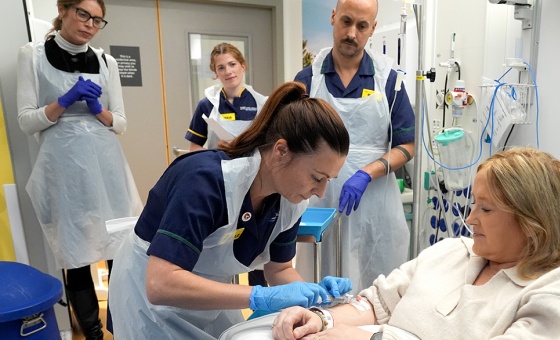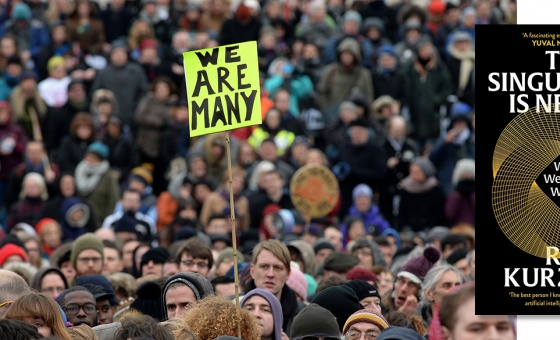This is the last article you can read this month
You can read more article this month
You can read more articles this month
Sorry your limit is up for this month
Reset on:
Please help support the Morning Star by subscribing here
THE election of Donald Trump as US president will undoubtedly benefit the billionaires, corporations and fossil fuel companies that dominate US economic life.
However, its roots lie in the disenchantment felt by large numbers of voters who previously backed the Democrats but didn’t this time after living standards took a hit in recent years.
A key lesson for our new government to learn from Trump’s election is the need to drive up living standards throughout this Parliament.
This is perhaps the key lens through which we need to assess the recent Budget.
There were many positives in this first Labour budget in 15 years. One very welcome step is the 7 per cent increase in the minimum wage — a pay boost for three million workers.
The Budget also marked a crucial departure from the toxic Tory austerity policies that have caused significant harm to our public services, communities and the lives of working people.
The Tories had pencilled in yet more deep cuts for this Parliament, and it is right that the new Labour government has rejected this slash-and-burn approach.
The initial boost to day-to-day spending in this Budget over the next couple of years is especially welcome. So too is the £100 billion boost to public investment to help rebuild our crumbling infrastructure.
These moves will fund welcome measures like 40,000 extra NHS appointments a week and the recruitment of 6,500 new teachers.
But it is concerning that the government’s spending boost for the next couple of years is not sustained throughout the Parliament.
The funding allocated so far won’t be enough to reverse the damage of a decade of Tory austerity. And because of how these funds are distributed, there’s a real risk that some unprotected departments will see future cuts at next Spring’s Spending Review.
Fixing public services was a key reason people voted Labour and if they don’t see sufficient change and sufficiently quickly, then the party will pay an electoral price. It’s clear that more public services funding is going to be needed in the coming years.
There are also concerns when looking at living standards. The Budget took place against the backdrop of the worst attack on living standards in decades.
Soaring energy and food bills meant the last Parliament was the only one in history where living standards were lower at the end than at the start. That worsened a long-term trend that has included wages flatlining for the better part of two decades.
The new Labour government is rightly very conscious of this and the role it played in the Tory collapse at the last election. It has repeatedly stressed the need to protect living standards.
However, relying mainly on economic growth to achieve this is a big gamble. Not only has growing wealth inequality often meant that any economic growth fails to reach the pockets of ordinary people but, as the Resolution Foundation states, this Budget does not reverse Britain’s trend of economic stagnation. Growth prospects remain weak.
The Resolution Foundation also warns that the outlook for living standards is troubling. While better than in the last Parliament, this is set to be the worst term for living standards under any Labour government ever.
It’s just as bad for wages which, at the end of this Parliament, are set to end up in 2029 “just shy of where they were in 2008."
The Joseph Rowntree Foundation’s post-budget forecast is even more alarming. It warns that, in real terms, average families will be £770 worse off by October 2029 compared to today.
Of course, averages mask even more difficult situations for millions of people who look to the Labour government. Already, seven million low-income households were forced to go without essentials like food, adequate clothing and basic toiletries in the six months up to the General Election.
The Budget decision not to scrap the two-child limit or axe the cut to Winter Fuel Allowance can only make this worse. Hundreds of thousands more children will fall into poverty over the next few years if the cap remains and 1.6 million pensioners already living in poverty will lose their winter fuel payment.
Potential cuts to benefits planned for next April would push many other people into poverty.
If living standards continue to suffer, it will inflict further pain on millions who have already been hit over recent years. It will also create significant political problems for the government.
All around the world, incumbents have been ousted over the past period as families have been squeezed.
So, despite the break from the worst of Tory austerity in the Budget, it’s clear that much more is needed: greater public service investment, more action to improve living standards and a focus on poverty reduction measures.
To fund this, we must pursue even stronger measures to tax wealth. The Budget included positive measures for those like me who believe that the wealthiest and tax dodgers should be made to pay their fair share.
Steps such as ending the “non-dom” scheme, raising capital gains tax rates, and extending the windfall tax on oil and gas profits are all important moves toward a fairer tax system. But more will be needed to fund the social investment our communities are crying out for.
I am campaigning for a 2 per cent tax on wealth above £10 million to generate the resources necessary to fund essential public services, alleviate poverty, and tackle the living standards crisis.
That is the type of bold idea that Labour will need to push to show whose side we are on and to prevent the electoral rise of Trump-like forces here.












